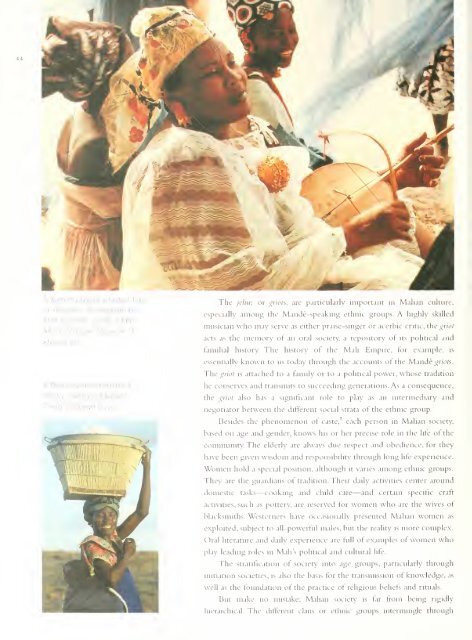SCOTLAND - Smithsonian Digital Repository - Smithsonian Institution
SCOTLAND - Smithsonian Digital Repository - Smithsonian Institution
SCOTLAND - Smithsonian Digital Repository - Smithsonian Institution
Create successful ePaper yourself
Turn your PDF publications into a flip-book with our unique Google optimized e-Paper software.
A woman<br />
[<br />
in<br />
Timbuktu. Knotograpn by<br />
Ehot Elisofon, 1959, EEPA<br />
4419. National Museum of<br />
African Art<br />
;J lute<br />
The /(/lie, or •^rioli, are particularly important in Malian culture,<br />
especially among the Mande-speakmg ethnic groups. A highly skilled<br />
musician who may serve as either praise-singer or acerbic critic, the griot<br />
acts as the memory of an oral society, a repository of its political and<br />
familial history. The history of the Mali Empire, for example, is<br />
essentially known to us today through the accounts ot the Mande griots.<br />
The (jiicir is attached to a family or to a political power, whose tradition<br />
A Dogon woman carrying a<br />
locally made reed basket.<br />
Photo © Shawn Davis<br />
he conserves and transmits to succeeding generations. As a consequence,<br />
the griot also has a significant role to play as an intermediary and<br />
negotiator between the different social strata ot the ethnic group.<br />
Besides the phenomenon of caste, each person in Malian society,<br />
based on age and gender, knows his or her precise role in the lite<br />
ot the<br />
community. The elderly are always due respect and obedience, tor they<br />
have been given wisdom and responsibility through long life experience.<br />
Women hold a special position, although it varies among ethnic groups.<br />
They are the guardians of tradition. Their daily activities<br />
center around<br />
domestic tasks—cooking and child care—and certain specific cratt<br />
activities, such as<br />
pottery, are reserved for women who are the wives of<br />
blacksmiths. Westerners have occasionally presented Malian women as<br />
exploited, subject to all-powerful males, but the reality is more complex.<br />
Oral literature and daily experience are full of examples of women who<br />
play leading roles m Mali's political and cultural life.<br />
The stratification of society into age groups, particularly through<br />
initiation societies, is<br />
also the basis for the transmission of knowledge, as<br />
well as the foundation of the practice of religious beliefs and rituals.<br />
But make no mistake: Malian society is far fi-om being rigidly<br />
hierarchical. The different clans or ethnic groups intermingle through
















